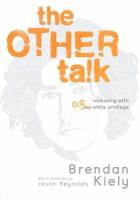
A valuable, necessary, and accessible book. Kiely has an easy-going manner and presents ideas that could be abstract, academic theory through relatable anecdotes and stories, more often than not about himself when he was a teenager. It reads quickly and directly addresses young white readers without confrontation or shaming, encouraging listening, empathy, and a sense of responsibility (instead of guilt). Highly recommended.
If I have one complaint, it's that Kiely tries so hard to be casual and appealing that he sometimes condescends to his readers and implies low expectations of their capabilities. Chapter 16, for instance, begins:
Soooo, Chapter 15 was getting a little long, so this really is just 15 extended . . . more on how it all comes back to listening.
All right. All right. More about listening. I know, I know. But to spark it up a bit, I'm bringing in professional basketball star Kyle Korver to help me make the point I'm trying to make: becoming better listeners is absolutely key to us better understanding our white privilege and how to take some responsibility for racism and white privilege. (Whew, that was a mouthful, but it really is what I'm getting at.)
A better representation of the book in general is this section, from near the end, which sums up everything he's been building to very nicely:
One night in college I sat in the large common area in one of the dorms. The room was packed with white students listening to a handful of Black students tell us about their experience being Black at Miami University. (In 2019 there were 17,246 students enrolled at the Oxford, Ohio, campus, and only 615 of them identified as Black; from 1995 to 1999, when I attended, the proportion of Black students at Miami was likely very much the same.) Although I felt bad about what they were saying, I also felt the need to defend myself. I didn't say it out loud, but on the inside I was shouting, But not me! Not me! Not me! I don't do that. So while I was listening to them (or supposed to be listening to them) talk about what they had to deal with, all I wanted to hear was one of them say, That's how many white people here make us feel, but not you, of course. You are an exception to that.
Maybe there is something natural about wanting to hear about yourself in some exceptional way. But not entirely. How much of my ego in that moment was based on what I assumed or imagined was hurtful white-people behavior instead of what the Black students were actually saying was
hurtful white-people behavior?
My throat runs dry just remembering the way my eyes darted around the room, the way they fell to the floor in front of me when any one of them looked at me as they shared their stories, the overwhelming silence (not from listening--that's different) I offered in return for their courage and strength to share their stories. How could I have been anything but yet another one of those white faces who stared at them through sideways glances and made them feel uncomfortable, unwelcome? Why couldn't I have found some courage to speak up and say, I believe you, to say, I'm sorry when I am one of those people, and I'd like to do better?
That would've been a pretty low bar to meet in order for me to be a decent human being. But I didn't even meet that bar that day.
So here's the thing: when someone is sharing their pain, their anger, their sadness, listen with interest and courage.
Here is not the thing: don't get defensive, need to feel like the exception, need to feel like the "good" white person as opposed to all those "other" white people. Don't condescend ("No, I know this already") or belittle ("No, but let me tell you how it really is")--those are definitely not the thing either. In fact, they can be really hurtful.
This is hard--I get that. I really do. It's so easy to say, "But look at all the progress that has been made." That's a whole lot easier than actually listening to the pain Black and Indigenous people and so many people of the Global Majority are talking about right now. Because when we listen to their pain, we as white people are part of the cause of it, and we can't blame it on the slaveholders of previous centuries, or the racist governors and sheriffs of the 1950s and '60s, or our sad uncle who always wants to sneak in that joke he knows he'll be told not to finish but thinks is funny anyway. This is why it is so important for all of us, white people included, to talk about--and listen about--racism and white privilege when we are with our families, in our religious and spiritual congregations, in our schools and libraries, and in our civic communities.
Because the pain isn't only yesterday. It's today. It's right now.
And we helped cause it--today--and that's hard to hear.
But we can't run away from the uncomfortableness we feel when we hear about the pain of others or the pain we ourselves have caused. We shouldn't protect ourselves from it or try to distance ourselves from it. We should sit with it, just as the woman in Albuquerque told me, in order to grow and learn and not repeat the mistakes of our past.
